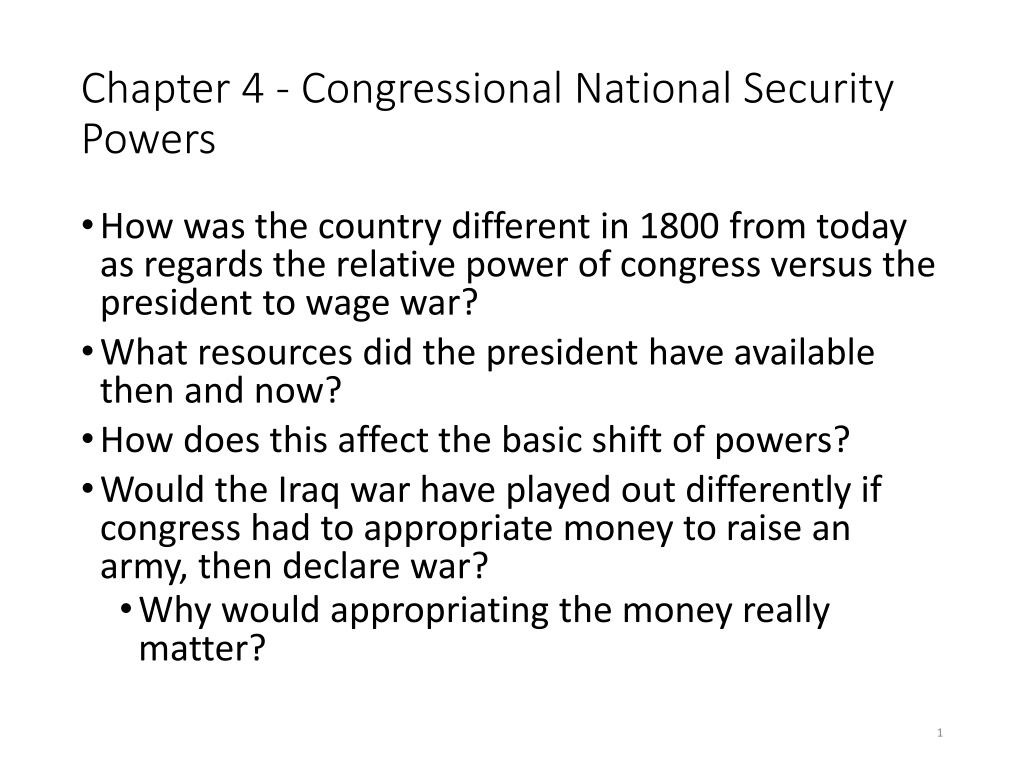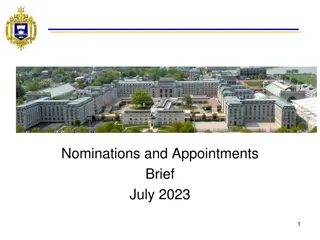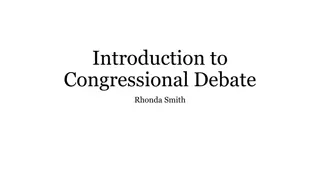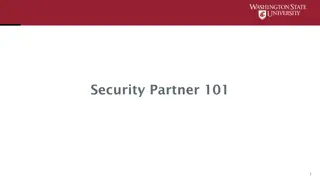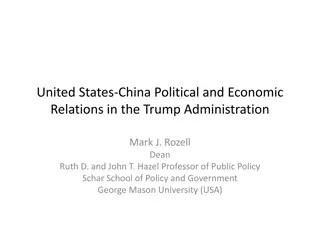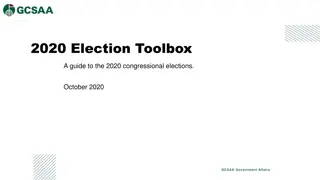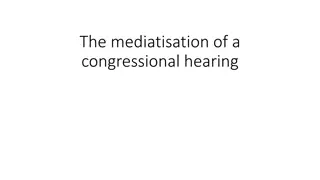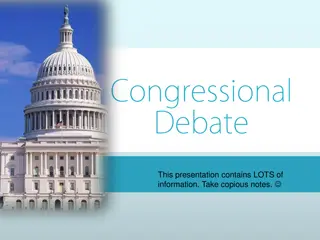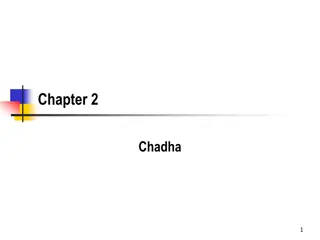Shift of Congressional Power in National Security Matters
The content discusses the historical and current power dynamics between Congress and the President in waging wars, including the resources available to the President then and now. It explores the implications of Congress having to appropriate money to raise an army and declare war, questioning how the Iraq war might have unfolded differently under such circumstances. Additionally, it touches on the process of declaring war, ending wars constitutionally, and legal effects of war on domestic laws.
Download Presentation

Please find below an Image/Link to download the presentation.
The content on the website is provided AS IS for your information and personal use only. It may not be sold, licensed, or shared on other websites without obtaining consent from the author.If you encounter any issues during the download, it is possible that the publisher has removed the file from their server.
You are allowed to download the files provided on this website for personal or commercial use, subject to the condition that they are used lawfully. All files are the property of their respective owners.
The content on the website is provided AS IS for your information and personal use only. It may not be sold, licensed, or shared on other websites without obtaining consent from the author.
E N D
Presentation Transcript
Chapter 4 - Congressional National Security Powers How was the country different in 1800 from today as regards the relative power of congress versus the president to wage war? What resources did the president have available then and now? How does this affect the basic shift of powers? Would the Iraq war have played out differently if congress had to appropriate money to raise an army, then declare war? Why would appropriating the money really matter? 1
Declarations of War 11 declarations of war over 5 wars: War of 1812 1846 War with Mexico Spanish-American War Word War I World War II What about the Revolutionary War and the Civil War? 2
Declaration of War Procedurally, how does congress declare war? Is the presentment clause involved? Can the president veto a declaration of war? What if the president disagrees - can he refuse to fight the war? 3
When is the War Over? Is there a constitutional provision for ending a declared war? If it is by treaty, what is the role of Congress? What if the president just quits fighting the war? When would the contingent authority and international law dominos revert to a pre-war state? Did we sign a peace treaty in Viet Nam? 4
The Legal Domino Effects of War Example 1 Alien Enemy Act, 50 U.S.C. 21 (2000), whenever there is a declared war between the United States and any foreign nation or government, citizens of the hostile nation or government who are at least 14 years old and not naturalized are subject to summary arrest, internment, and deportation when the President so proclaims. Trading With the Enemy Act, 50 U.S.C. App. 1-44 (2000) enables the President to regulate or prohibit commerce with an enemy state or its citizens after Congress has declared war or the existence of a state of war. And the President may authorize electronic surveillance, physical searches, and the use of pen registers and trap and trace devices to acquire foreign intelligence without a court order for up to 15 days following a declaration of war by Congress. How would these work in the war on terrorism? 5
Congress and the Quasi-War with France Changing the Prize Rules for Recapture (Recaptured from the French) the return of recaptured U.S. vessels to their owners for a salvage payment of one-eighth of the full value. Act of June 28, 1798, ch. 62, 1 Stat. 574. if retaken from the enemy : : : the owners are to allow : : :one half [of the whole value for salvage]. : : : [Act of Mar. 2, 1799, ch. 24, 7, 1 Stat. 709, 716 6
Bas v. Tingy, 4 US 37 (1800) On April 21, 1799, Captain Tingy, commander of the public armed ship Ganges, recaptured the Eliza, which belonged to John Bas and had been captured by a French privateer on the high seas on March 31, 1799. Tingy sought one-half the value of the Eliza, as provided by the 1799 act. But Bas argued that the act only applied to vessels retaken from the enemy, and that France was not an enemy. (Tingy would only get 1/8th.) 7
The Legal Questions Is France an enemy? Was there a War? Was it a solemn or perfect war? Was there a declaration of war with France? Is a perfect war necessary to have an enemy under the statute? 8
What War-like Actions Were Authorized? 1st. To resist the search of a French public vessel: 2d. To capture any vessel that should attempt, by force, to compel submission to a search: 3d. To re-capture any American vessel seized by a French vessel: and 4th. To capture any French armed vessel wherever found on the high seas. 9
Imperfect War What is an imperfect war? How do you know you are in an imperfect war? Does an imperfect war create a legal enemy? Remember from the Prize Cases: if you are attacked, it is a war and an enemy/ Does this trigger the 1799 act? Does the Captain get to keep his 1/2? 10
Preamble to the Authorization of Military Force after 9/11 s Joint Resolution To authorize the use of United States Armed Forces against those responsible for the recent attacks launched against the United States. Whereas, on September 11, 2001, acts of treacherous violence were committed against the United States and its citizens; and Whereas, such acts render it both necessary and appropriate that the United States exercise its rights to self-defense and to protect United States citizens both at home and abroad; and Whereas, in light of the threat to the national security and foreign policy of the United States posed by these grave acts of violence; and Whereas, such acts continue to pose an unusual and extraordinary threat to the national security and foreign policy of the United States; and Whereas, the President has authority under the Constitution to take action to deter and prevent acts of international terrorism against the United States: Resolved by the Senate and House of Representatives of the United States of America in Congress assembled, 11
The Authorization of Military Force after The Authorization of Military Force after 9/11 9/11 SEC. 2. AUTHORIZATION FOR USE OF UNITED STATES ARMED FORCES. (a) IN GENERAL. That the President is authorized to use all necessary and appropriate force against those nations, organizations, or persons he determines planned, authorized, committed, or aided the terrorist attacks that occurred on September 11, 2001, or harbored such organizations or persons, in order to prevent any future acts of international terrorism against the United States by such nations, organizations or persons. 12
(b) WAR POWERS RESOLUTION REQUIREMENTS. (1) SPECIFIC STATUTORY AUTHORIZATION. Consistent with section 8(a)(1) of the War Powers Resolution, the Congress declares that this section is intended to constitute specific statutory authorization within the meaning of section 5(b) of the War Powers Resolution. (2) APPLICABILITY OF OTHER REQUIREMENTS. Nothing in this resolution supercedes any requirement of the War Powers Resolution. 13
What is the Effect of the AUMF? Does Sec. 2 use the word war? Does it name any specific enemies? Does this meet the traditional purpose of a declaration of war: putting the world on notice of who you are fighting? What is vagueness a problem for foreign countries and their citizens? Should such a declaration trigger the usual war measures, including international law duties? 14
War Powers Resolution November 7, 1973
The Politics of the War Powers Resolution The Vietnam War is very unpopular. The Pentagon Papers (discussed later) has undermined the military s credibility on the winnability and objectives of the war. Nixon has secretly expanded the war against Congressional wishes. The Watergate scandal started June 1972. Nixon resigns August 1974. Congress tries to take back power that has been lost over the past 150 years. We will talk about the Church Committee reforms later in the course. 16
SECTION 2 [1541]. PURPOSE AND POLICY (a) It is the purpose of this chapter to fulfill the intent of the framers of the Constitution of the United States and insure that the collective judgment of both the Congress and the President will apply to the introduction of United States Armed Forces into hostilities, or into situations where imminent involvement in hostilities is clearly indicated by the circumstances, and to the continued use of such forces in hostilities or in such situations. ... (c) The constitutional powers of the President as Commander-in-Chief to introduce United States Armed Forces into hostilities, or into situations where imminent involvement in hostilities is clearly indicated by the circumstances, are exercised only pursuant to (1) a declaration of war, (2) specific statutory authorization, or (3) a national emergency created by attack upon the United States, its territories or possessions, or its armed forces. What about omitted powers, such as rescue, protecting navigation, protective quarantines (Cuban missile crisis), humanitarian interventions, etc.? 17
SECTION 3 [1542]. CONSULTATION The President in every possible instance shall consult with Congress before introducing United States Armed Forces into hostilities or into situations where imminent involvement in hostilities is clearly indicated by the circumstances, and after every such introduction shall consult regularly with the Congress until United States Armed Forces are no longer engaged in hostilities or have been removed from such situations.
Is it Worth Talking to Congress? Critics ask what good it would do to consult with Congress about most questions of national security or foreign relations: its members are allegedly parochial, partisan, poorly informed, preoccupied with re-election, and, in a word, collectively unwise about national security and foreign affairs. Indeed, involving them may effectively amount only to involving their staffs, with a substantially increased risk of leaks that will compromise national security. See, e.g., Robert F. Turner, Repealing the War Powers Resolution 110 (1991). On the other hand, some members of Congress have far more experience and a much more sophisticated understanding of national security and foreign affairs than some Presidents, who have had no prior experience in national office or even in any public office.
SECTION 4 [1543]. REPORTING REQUIREMENT [the trigger] (a) In the absence of a declaration of war, in any case in which United States Armed Forces are introduced (1) into hostilities or into situations where imminent involvement in hostilities is clearly indicated by the circumstances; (2) into the territory, airspace or waters of a foreign nation, while equipped for combat, except for deployments which relate solely to supply, replacement, repair, or training of such forces; or (3) in numbers which substantially enlarge United States Armed Forces equipped for combat already located in a foreign nation; the President shall submit within 48 hours to the Speaker of the House of Representatives and to the President pro tempore of the Senate a report, in writing, setting forth (A) the circumstances necessitating the introduction of United States Armed Forces; (B) the constitutional and legislative authority under which such introduction took place; and (C) the estimated scope and duration of the hostilities or involvement.
Reporting - Continuing duty (b) The President shall provide such other information as the Congress may request in the fulfillment of its constitutional responsibilities with respect to committing the Nation to war and to the use of United States Armed Forces abroad. (c) Whenever United States Armed Forces are introduced into hostilities or into any situation described in subsection (a) of this section, the President shall, so long as such Armed Forces continue to be engaged in such hostilities or situation, report to the Congress periodically on the status of such hostilities or situation as well as on the scope and duration of such hostilities or situation, but in no event shall he report to the Congress less often than once every six months.
SECTION 5 [1544]. CONGRESSIONAL ACTION (a) Each report submitted pursuant to section 1543(a)(1) of this title shall be transmitted to the Speaker of the House of Representatives and to the President pro tempore of the Senate on the same calendar day. Each report so transmitted shall be referred to the Committee on Foreign Affairs of the House of Representatives and to the Committee on Foreign Relations of the Senate for appropriate action. If, when the report is transmitted, the Congress has adjourned sine die or has adjourned for any period in excess of three calendar days, the Speaker of the House of Representatives and the President pro tempore of the Senate, if they deem it advisable (or if petitioned by at least 30 percent of the membership of their respective Houses) shall jointly request the President to convene Congress in order that it may consider the report and take appropriate action pursuant to this section.
SECTION 5 [1544]. CONGRESSIONAL ACTION [automatic termination of presidential authority] (b) Within sixty calendar days after a report is submitted or is required to be submitted pursuant to section 1543(a)(1) of this title, whichever is earlier, the President shall terminate any use of United States Armed Forces with respect to which such report was submitted (or required to be submitted), unless the Congress (1) has declared war or has enacted a specific authorization for such use of United States Armed Forces, (2) has extended by law such sixty-day period, or (3) is physically unable to meet as a result of an armed attack upon the United States. Such sixty-day period shall be extended for not more than an additional thirty days if the President determines and certifies to the Congress in writing that unavoidable military necessity respecting the safety of United States Armed Forces requires the continued use of such Armed Forces in the course of bringing about a prompt removal of such forces.
SECTION 5 [1544]. CONGRESSIONAL ACTION [directed termination] (c) Notwithstanding subsection (b) of this section, at any time that United States Armed Forces are engaged in hostilities outside the territory of the United States, its possessions and territories without a declaration of war or specific statutory authorization, such forces shall be removed by the President if the Congress so directs by concurrent resolution. [Sections 6 & 7, 1545-1546, Congressional Priority Procedures for Joint Resolution or Bill, and for Concurrent Resolution, respectively, provide for expedited consideration of measures to approve the President s actions under 1544(b) or disapprove them under 1544(c).] [Is a binding concurrent resolution constitutional after Chadha?]
SECTION 8 [1547]. INTERPRETATION OF JOINT RESOLUTION [implicit authorization] (a) Authority to introduce United States Armed Forces into hostilities or into situations wherein involvement in hostilities is clearly indicated by the circumstances shall not be inferred (1) from any provision of law (whether or not in effect before November 7, 1973), including any provision contained in any Appropriation Act, unless such provision specifically authorizes the introduction of United States Armed Forces into hostilities or into such situations and states that it is intended to constitute specific statutory authorization within the meaning of this chapter; or (2) from any treaty heretofore or hereafter ratified unless such treaty is implemented by legislation specifically authorizing the introduction of United States Armed Forces into hostilities or into such situations and stating that it is intended to constitute specific statutory authorization within the meaning of this chapter.
Committing Troops (c) For purposes of this chapter, the term introduction of United States Armed Forces includes the assignment of members of such Armed Forces to command, coordinate, participate in the movement of, or accompany the regular or irregular military forces of any foreign country or government when such military forces are engaged, or there exists an imminent threat that such forces will become engaged, in hostilities. 26
Savings Clause (d) Nothing in this chapter (1) is intended to alter the constitutional authority of the Congress or of the President, or the provisions of existing treaties; or [no new implied powers] (2) shall be construed as granting any authority to the President with respect to the introduction of United States Armed Forces into hostilities or into situations wherein involvement in hostilities is clearly indicated by the circumstances which authority he would not have had in the absence of this chapter.
Why did Nixon Say the War Powers Resolution was Unconstitutional? House Joint Resolution 542 would attempt to take away, by a mere legislative act, authorities which the President has properly exercised under the Constitution for almost 200 years. One of its provisions would automatically cut off certain authorities after sixty days unless the Congress extended them. : : : : : : The only way in which the constitutional powers of a branch of the Government can be altered is by amending the Constitution and any attempt to make such alterations by legislation alone is clearly without force.
What did Nixon Say About the Effect on Foreign Policy? I am also deeply disturbed by the practical consequences of this resolution. For it would seriously undermine this Nation s ability to act decisively and convincingly in times of international crisis. As a result, the confidence of our allies in our ability to assist them could be diminished and the respect of our adversaries for our deterrent posture could decline. A permanent and substantial element of unpredictability would be injected into the world s assessment of American behavior, further increasing the likelihood of miscalculation and war. 29
Effect on Treaties How does it attempt to turn all mutual defense treaties into non-self-executing treaties? Is there a constitutional problem with this? What treaty military actions did it leave unaffected? unless such treaty is implemented by legislation specifically authorizing the introduction of United States Armed Forces into hostilities or into such situations and stating that it is intended to constitute specific statutory authorization within the meaning of this joint resolution.
Why Was Nixon Concerned about Congressional Inaction Limiting Presidential Power? I am particularly disturbed by the fact that certain of the President s constitutional powers as Commander in Chief of the Armed Forces would terminate automatically under this resolution 60 days after they were invoked. No overt Congressional action would be required to cut off these powers they would disappear automatically unless the Congress extended them. In effect, the Congress is here attempting to increase its policymaking role through a provision which requires it to take absolutely no action at all. What are the practical political consequences? 31
The Veto Nixon's veto undermined the original intent of the resolution to be an agreed power sharing plan. Nixon s weakness emboldened Congress to override the veto. Subsequent presidents have mostly complied with the reporting requirements but have maintained that any limitations on their powers are unconstitutional. 32
Is the WPR Just Political Cover: The Free Pass [T]he defect at the heart of the WPR is that it has given both the President and Congress a putative free pass. In the actual contemporary exercise of war powers, perception has become reality as both the media and many members of Congress overlook the WPR s disclaimer of authority [ 8(d)(2), 50 U.S.C. 1547(c)(2) (2000).] Thus, some proponents of unilateral presidential action invoke the putative sixty-day free pass as license to use force abroad without constitutionally required advance authorization from Congress. Congress, for its part, takes false comfort that it has somehow fulfilled its constitutional duty to decide on uses of force abroad by doing nothing.
Should/Could Congress revise the War Powers Resolution to make it more effective?
DELEGATIONS AND APPROPRIATIONS FOR NATIONAL SECURITY 35
Lichter v. US, 334 US 742 (1948) (nondelegation challenge to statute allowing recapture of war profiteering) The power to wage war is the power to wage war successfully. : : : : : : [I]t may be said that the power has been expressly given to Congress to prosecute war, and to pass all laws which shall be necessary and proper for carrying that power into execution. That power explicitly conferred and absolutely essential to the safety of the Nation is not destroyed or impaired by any later provision of the Constitution or by any one of the amendments. These may all be construed so as to avoid making the constitution self-destructive, so as to preserve the rights of the citizen from unwarrantable attack, while assuring beyond all hazard the common defence and the perpetuity of our liberties. These rest upon the preservation of the nation. It has been said that the Constitution marches. That is, there are constantly new applications of unchanged powers, and it is ascertained that in novel and complex situations, the old grants contain, in their general words and true significance, needed and adequate authority. So, also, we have a fighting Constitution. 36
Breadth of Congressional Defense Appropriations Powers fix the amount of rent to be charged for every room, home, or building and this even though to an individual landlord there may be less than a fair return; to construct extensive systems of public works; to operate railroads; to prohibit the sale of liquor; to restrict freedom of speech in a manner that would be unwarranted in time of peace; to ration and allocate the distribution of every commodity important to the war effort; to restrict the personal freedom of American citizens by curfew orders and the designation of areas of exclusion; and, finally, to demand of every citizen that he serve in the armed forces of the nation. [Spaulding v. Douglas Aircraft Co., 154 F.2d 419, 422-423 (9th Cir. 1946) The Defense Production Act is being used to force manufacturers to produce goods to fight the COVID pandemic. The HHS (through CDC) issued a COVID eviction moratorium. 37
Greene v. McElroy, 360 US 474 (1959) This case tests how far the President s powers go under the general right protect national security. Plaintiff lost his security clearance because of testimony of confidential informants This meant his career in aerospace was over What is the due process problem? He was given no due process, certainly no right to confront or cross examine the witnesses against him. [This is well before Goldberg and the New Property cases.] 38
Classification and Government Secrets This happens in the context of the process for classifying documents and preventing their unauthorized release. The court finds that the president has the power to classify documents, even thought it is not spelled out in statute. We will learn later that this is entirely under Presidential whim. There is no statute and no regulations, only EOs. Why is that a necessary power under the power to protect national security? 39
Legal Issue Plaintiff claims that there is no authority for this action. He has been denied basic due process. While this is before the New Property cases, why does the court find that there is a due process question? Where administrative action has raised serious constitutional problems, the Court has assumed that Congress or the President intended to afford those affected by the action the traditional safeguards of due process. These cases reflect the Court s concern that traditional forms of fair procedure not be restricted by implication or without the most explicit action by the Nation s lawmakers, even in areas where it is possible that the Constitution presents no inhibition. Key the court is concerned that this be done intentionally, not as unintended colleterial damage. 40
The Defenses The government raises the president s inherent power over national security and that Congress ratified these actions by authorizing the defense appropriations bill. The presidential power is not at issue because the president did not make any specific findings or authorization for the process. The problem with the ratification theory: They must be made explicitly not only to assure that individuals are not deprived of cherished rights under procedures not actually authorized, but also because explicit action, especially in areas of doubtful constitutionality, requires careful and purposeful consideration by those responsible for enacting and implementing our laws. Without explicit action by lawmakers, decisions of great constitutional import and effect would be relegated by default to administrators who, under our system of government, are not endowed with authority to decide them. The Court wants Congress to specifically consider the issue, not claim a thousand-page bill authorizes everything the president does with the money. 41
The Limits of This Decision Nor do we decide whether the President has inherent authority to create such a program, whether congressional action is necessary, or what the limits on executive or legislative authority may be. We decide only that in the absence of explicit authorization from either the President or Congress the respondents were not empowered to deprive petitioner of his job in a proceeding in which he was not afforded the safeguards of confrontation and cross-examination. As we learn in administrative law, the constitutional does allow summary terminations for national security workers and does not require due process hearings when the government revokes a security clearance. 42
Can Congress Delegate the War Power? While raised by scholars, it is not clear whether this is a meaningful question. Congress cannot delegate the power to make a formal declaration of war because that is limited by the Constitution. Congress does not need to delegate the war making power: if there is a standing army, the president can make war whenever it suits him or her. What if Congress passes a law preventing a specific military action and the president takes that action, arguing that it authorized under his inherent powers to defend the nation? Little and the Prize Cases depended on the special circumstances of the prize system. Even if it had been a taking, that would not help foreigners on foreign soil. Impeachment and cutting off funding are the real limits on presidential power to make war. 43
Wielding the Appropriations Power 44
United States House of Representatives v. Mnuchin, 976 F.3d 1 (D.C. Cir. 2020) This is a standing case to determine if the House as a body has standing to sue the executive over what the House argues is an illegal use of appropriated funds. It is very difficult to get standing to directly contest government spending. Taxpayer standing has been limited to narrow religious establishment cases, and those are in question with the current court. Persons directly harmed by the spending a border wall fence on their property, for example can get standing under Lujan. This was dodged by building on public land, which shifted challenges to environmental damage theories. Without standing, the executive can act illegally and there is no mechanism for judicial remedy. Reserve military officers in Congress violate the constitution, but the court has not allowed anyone standing to challenge their serving. Congress or the Executive could fix it, but does not. 45
The Facts The United States House of Representatives brought this lawsuit alleging that the Departments of Defense, Homeland Security, the Treasury, and the Interior, and the Secretaries of those departments violated the Appropriations Clause of the Constitution as well as the Administrative Procedure Act when transferring funds appropriated for other uses to finance the construction of a physical barrier along the southern border of the United States, contravening congressionally approved appropriations. The district court found no standing and it was appealed to this court. 46
The Appropriations Clause The Constitution provides, No Money shall be drawn from the Treasury, but in Consequence of Appropriations made by Law. U.S. Const. art. I, 9, cl. 7. Because the clause is phrased as a limitation, it means that the expenditure on public funds is proper only when authorized by Congress, not that public funds may be expended unless prohibited by Congress. While it is not at issue in this case, the court has previously ruled that the president cannot spend privately raised money. That came up in a national security case. President Regan s staff raised private money to fund a private paramilitary operation that Congress had banned funding. The separation between the Executive and the ability to appropriate funds was frequently cited during the founding era as the premier check on the President s power. In fact, the separation of purse and sword was the Federalists strongest rejoinder to Anti-Federalist fears of a tyrannical president. 47
Why the House, as Opposed to Congress? a repeated theme in the founding era was the importance of putting the power of the purse specifically in the hands of the representatives of the people. Note the Senate was not elected until 1913. an early draft of the Constitution went as far as to require [that] appropriations bills originate in the House of Representatives, the representatives of the people. While the final text does not include that same origination provision and provides only that [a]ll bills for raising Revenue shall originate in the House of Representatives, [u]nder immemorial custom the general appropriations bills . . . originate in the House of Representatives. the House has returned to the Senate a Senate bill or joint resolution appropriating money on the ground that it invaded the prerogatives of the House. The appropriations statute at issue in this case originated with the House, as is traditional. 48
Forms of Appropriations Limits Not appropriating the money for a specific project. Since this is implicit, it is stronger if the President s budget asked for the money and it was specifically refused. Saying in the appropriations bill which would have included the money that it cannot be spent for the specific purpose. Putting a prohibition on enforcement of a Clean Air Act provision in the EPA funding bill. Putting a limitation on the border fence in the Defense Appropriations Bill Putting a spending limitation as a rider in an unrelated bill. Since the constitution does not allow the President a line item veto, the president must veto the entire bill, which could shutdown the government, to kill the rider. 49
Congressional Limits through Appropriations Spaulding v. Douglas Aircraft (1945) Congress in making appropriations has the power and authority not only to designate the purpose of the appropriation, but also the terms and conditions under which the executive department . . . may expend such appropriations. . . . The purpose of appropriations, the terms and conditions under which said appropriations were made, is a matter solely in the hands of Congress and it is the plain and explicit duty of the executive branch . . . to comply with the same. Given Chevron, why are limits on appropriations more effective than direct legislation on agency authority? 50
